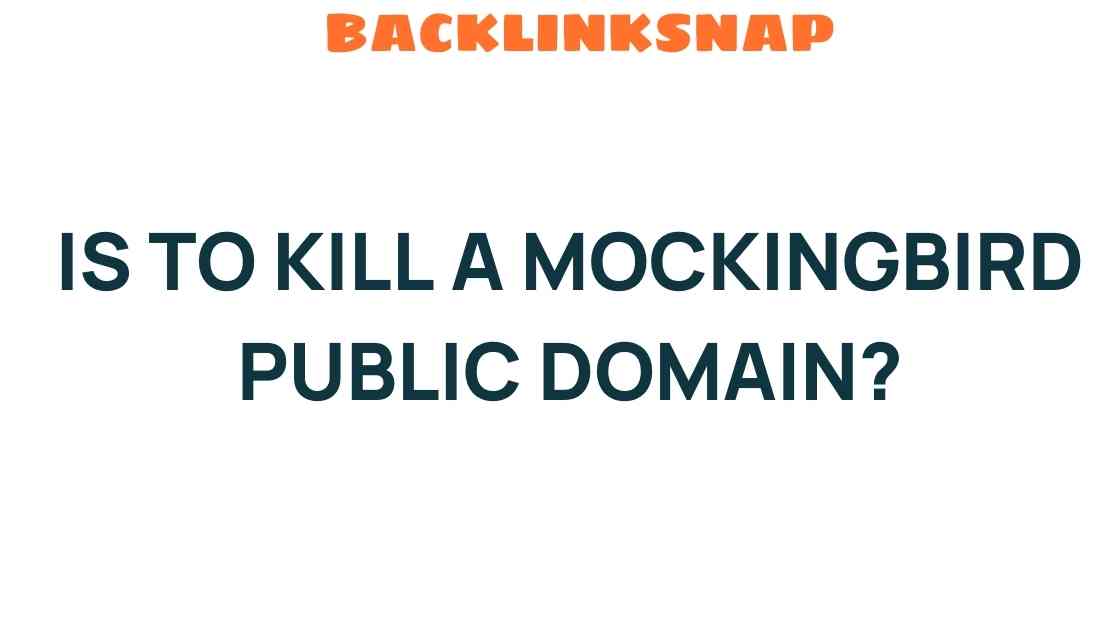Is “To Kill a Mockingbird” Public Domain?
The question of whether Harper Lee’s iconic novel To Kill a Mockingbird is in the public domain is not just a legal inquiry but a cultural one that resonates with readers, educators, and scholars alike. This literary classic, first published in 1960, has become a cornerstone of American literature, addressing themes of racial injustice and moral growth. Understanding its copyright status requires a nuanced look at copyright law, the expiration of intellectual property rights, and the implications for readers and creators.
Copyright Law and Its Expiration
Copyright law protects the rights of authors and creators, granting them exclusive rights to their works for a limited time. The duration of copyright protection has evolved significantly over the years. Under current U.S. law, works published after January 1, 1978, are protected for the life of the author plus 70 years. For works published before this date, the rules differ. To Kill a Mockingbird falls into the category of works published before 1978, which means its copyright status is determined by a different set of rules.
Initially, works published before 1978 were protected for 28 years, with the possibility of renewal for an additional 67 years. This means that the total potential duration of copyright for these works could extend to 95 years from their publication date.
The Status of “To Kill a Mockingbird”
Harper Lee passed away on February 19, 2016. Therefore, counting the years since its publication in 1960, the copyright for To Kill a Mockingbird will not expire until 2056, meaning it is currently still under copyright protection. This places it firmly outside the realm of public domain, which typically allows for free access, reproduction, and adaptation of a work by the general public.
Legal Implications of Copyright Status
The copyright status of To Kill a Mockingbird carries significant implications for authors, educators, and the public. Since the novel remains under copyright, any reproduction, adaptation, or public performance of the text requires permission from the rights holder. This can lead to a number of challenges:
- Educational Use: Teachers wishing to use excerpts in their curriculum must ensure they comply with copyright law, often requiring licenses for reproducing larger portions of the text.
- Adaptations: Filmmakers and playwrights must seek permission to create adaptations, which can lead to potential legal battles if they proceed without proper rights.
- Publishing New Editions: Publishers looking to reissue the book or create special editions must negotiate with rights holders, impacting the market availability of the novel.
The Importance of Public Domain
The concept of public domain is vital for cultural and literary enrichment. Works that enter the public domain allow for broader access, creativity, and reinterpretation. Once a work is in the public domain, anyone can use it freely, which can lead to innovative adaptations, scholarly research, and greater dissemination of knowledge.
For example, classic works like Shakespeare’s plays and Mark Twain’s novels have inspired countless adaptations and retellings, enriching the cultural landscape. The eventual transition of To Kill a Mockingbird into the public domain will likely produce similar opportunities for new generations of writers and creators to engage with Lee’s themes and characters.
What Happens When Copyright Expires?
When the copyright for To Kill a Mockingbird expires in 2056, it will enter the public domain, allowing anyone to:
- Reproduce the text without permission.
- Create adaptations, including films, stage plays, and new literary interpretations.
- Incorporate characters and themes into new works without legal restrictions.
This transition will not only honor Harper Lee’s legacy but also invigorate discussions around the themes of the book, encouraging new interpretations and dialogues about issues of race, justice, and morality in contemporary society.
Conclusion
In conclusion, To Kill a Mockingbird is not in the public domain and will remain under copyright until 2056. Understanding the legal landscape surrounding this literary classic is essential for anyone engaging with the text, whether for educational purposes, adaptation, or personal enjoyment. The eventual shift to public domain status promises to unlock a wealth of creative potential, fostering a renewed interest in Harper Lee’s powerful narrative. As we await the expiration of its copyright, we can appreciate the profound impact this work continues to have on American literature and society.
FAQs
- When will “To Kill a Mockingbird” enter the public domain?
The copyright will expire in 2056, at which point it will enter the public domain. - Can I quote from “To Kill a Mockingbird” without permission?
You can quote brief excerpts under fair use, especially for educational or commentary purposes, but larger segments require permission. - What happens if I use the text without permission?
Using the text without permission can result in copyright infringement claims, which may lead to legal action. - Can adaptations be made before the copyright expires?
Yes, but they must obtain permission from the rights holder, which could be Harper Lee’s estate. - Are there any exceptions for educational use?
Yes, educational use may fall under fair use, but it’s essential to understand the limits on the amount used. - What can I do now with “To Kill a Mockingbird”?
You can analyze, discuss, and critique the book freely, but be mindful of copyright rules regarding reproduction.
For more information on copyright laws, visit the Cornell Legal Information Institute.
If you’re a fan of literary classics, consider diving into the world of public domain works as they offer a treasure trove of creative possibilities. Explore sites like Project Gutenberg for free access to thousands of classic texts.
This article is in the category Digital Marketing and created by BacklinkSnap Team




